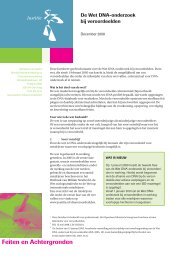INTERPOL HANDBOOK ON DNA DATA EXCHANGE AND PRACTICE
INTERPOL HANDBOOK ON DNA DATA EXCHANGE AND PRACTICE
INTERPOL HANDBOOK ON DNA DATA EXCHANGE AND PRACTICE
You also want an ePaper? Increase the reach of your titles
YUMPU automatically turns print PDFs into web optimized ePapers that Google loves.
Familial searching is not performed in the United States National <strong>DNA</strong> Index System(NDIS) operated and maintained by the Federal Bureau of Investigation (FBI). However,one state, California 17 , announced that it would begin a familial search program ofits State Offender <strong>DNA</strong> Database in late 2008. Another state, Maryland, has recentlylegislatively banned “familial searching” of its State <strong>DNA</strong> Database. The Maryland lawprovides that: “A person may not perform a search of the state-wide <strong>DNA</strong> Databasefor the purpose of identification of an offender in connection with a crime for whichthe offender may be a biological relative of the individual from whom the <strong>DNA</strong> samplewas acquired” 18 .Most database hits occur between offender samples and crime scenes. The databasesoftware that directly compares <strong>DNA</strong> from crime scenes and individuals is designedto return identical matches and to also allow for some mismatching between <strong>DNA</strong>profiles. Mismatching is permitted because the crime scene <strong>DNA</strong> can be degraded and/or contain <strong>DNA</strong> from two or more individuals. A familial search would only occur afterthe routine search of an offender <strong>DNA</strong> Database produced no candidate matches.Familial searching is predicated on the genetic relationship between family members,whereby one allele at each locus is contributed by the mother and one from the father 19 .Thus, the presence of a large number of shared alleles between non-matching profiles(non-matching because it is not an identical match), indicates that a close relative ofthe individual whose profile is on the database may have been involved in the crime.“Familial searching” is a second, deliberate search of the <strong>DNA</strong> Database at a lowerstringency. It is done in order to identify <strong>DNA</strong> profiles of known individuals (offenders,arrestees or suspects) that are not an identical match to the crime scene <strong>DNA</strong> profilebut may match a significant number of alleles as to lead the forensic scientist to believethat the suspect is a close biological relative of the known individual.The term “familial searching” is frequently used in conjunction with “partial matches.”“Familial searching” is not the same as a “partial match.” In the US, serious debatehas occurred concerning “partial matches.” Unlike familial searches, “partial matches”;are not deliberate searches to identify possible relatives of the perpetrator. “Partialmatches” are the identification, by a forensic scientist, of <strong>DNA</strong> profiles from differentindividuals that have significant profile similarity. “Partial matches” are the consequenceof the database search algorithms that allow mismatching between crime scene andoffender profiles. As noted previously, some <strong>DNA</strong> software can be configured to allowmismatching in an effort to ensure matches are not missed due to degradation ormixture resolution.Therefore, a “partial match” is a fortuitous event identified by a forensic scientist who,when evaluating the candidate match from a routine <strong>DNA</strong> Database search, determinesthat the two <strong>DNA</strong> profiles do not match but, because of the similarity in the profilesand the number of common alleles, indicates that a close biological relative of theoffender may be linked to the evidence. In the US, it is left up to each state to determineif they will release information relating to a “partial match” to the investigating agency.The National <strong>DNA</strong> Index System administered by the FBI has a mechanism for a casespecific review of “partial matches” identified at the national level.FAMILIAL SEARCHING PAGE 75







